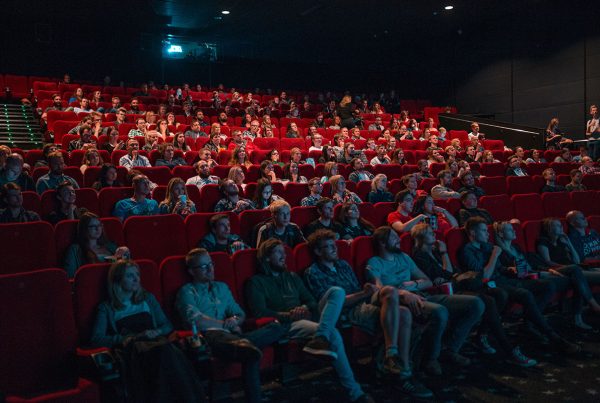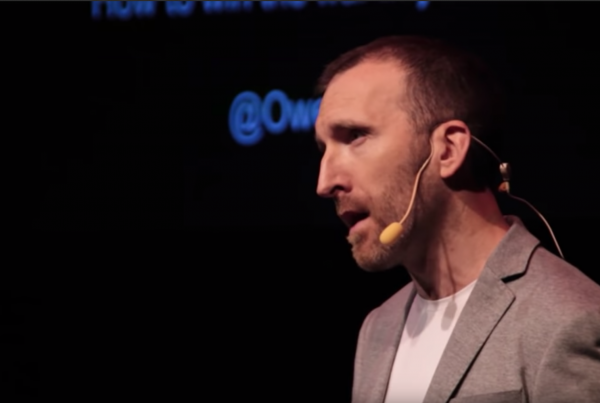1. Realize that the past is not real – Okay, here’s the inside scoop…the past is not real! You do not own a time machine and you are not capable of going through the exact same experience more than once. I know it may sound like I’m stating the bleeding obvious here but it needs to be said. When we are hooked into re-living the past what we are actually doing is re-playing internal memories of the past stored in our autobiographical memory. Re-playing these memories can generate feelings similar to how we felt when we had the experience but they are still only memories…movies we play inside our mind…they’re not the real thing.
It’s a bit like going to a theme park and taking part in a rollercoaster simulator. We know it’s not the real thing but we act ‘as if’ it is. It’s perhaps not quite as intense but we still get some of the emotion and thrill we get when we are on an actual rollercoaster.
Getting lost in the past is a bit like going on a scary simulator and then forgetting it’s not the real thing. It’s like watching a really bad movie (like Taken 2), hating it and then going back to see it voluntarily several times a day. It doesn’t make sense so why do it inside your mind?! (Apologies to Taken 2 fans but be honest, did it really merit a second instalment? 🙂 )
2. Realize that you are not your past but a product of how you’ve interpreted you past memories – It’s time to stop using your past experiences as an excuse. If you find yourself saying things like ‘I am this way because…’ (And then list a load of things that have happened to you) then stop it. Past experiences do not dictate who you are or who you turn out to be. Its how you have interpreted and continue to interpret those past experiences that count.
While some people clearly have advantages in terms of upbringing and support nothing is set in stone. For example, take three different people who were bullied as children. One could grow up to become a bully themselves, another could turn into a complete wallflower and the third could draw strength from it and start an anti bullying campaign. Three similar experiences all with drastically different outcomes because of how the individual interpreted the situation. The great thing is It’s up to you how you interpret the things that happen to you. As soon as you change the meaning you draw from your past experiences you change the way you feel and hence how you think and behave in the present.
3. Find the real learning – One way to help re-interpret past memories and let go of any negative emotions attached to them is to find the real learning. One of the main reasons we are still emotionally involved in our past memories is that we missed the real learning or created a misinformed opinion about what happened. We find ourselves in a situation where we haven’t yet developed the resources and/or skills to deal with it effectively and it affects us emotionally. These feelings are then attached to the memories to highlight a need for learning. If we miss the learning the feeling can linger on and create the urge to re-play the memory over and over in your mind. It’s almost like we do a kind of ‘peter pan syndrome’ thing on the experience. We grow up but the memory stays locked in time.
The main reason we feel negative emotions is to highlight that something needs attention and to tell us we need to make some kind of new learning. Recognise and take on board this learning and the memory with the bad feeling has served its purpose.
There are lots of practical ways to go back and find the learning. One quick way is to simply look back at the memory through older, wiser eyes and ask, “What was I really meant to learn from this experience?” When you get an answer make a pact with yourself to act on the new learning. You’ll be amazed how just doing that can completely release your association with the past memory (you might even start to feel good about it). Another technique is to go back and imagine you are a neutral observer. What advice would you give that younger you? What new information is now available to you now from this neutral place that transforms the memory of that experience?
4. Plan for the future – Ask yourself what you would like to do differently in the future as a result of the experience. Remember, the function of bad memories is to highlight that something has to be learned or addressed. Once you get a sense of what the new learning is allow your mind to drift off into the future and imagine taking on board this new learning. Notice how it positively impacts your life then look back from this place and realize the bad experience made this new learning possible. I can’t begin to tell you how many times I’ve used this and how powerful it can be.
5. Use Humour – Humour is one of the most universal and useful emotions we have available to us. It can diffuse arguments almost in an instant, it can dissolve negative emotions nearly as fast. Here’s a quick trick you can use that will help neutralize any bad feelings you have attached to a memory.
- Allow the memory to come to mind until you start to feel bad.
- Now start playing silly music inside your mind as you play through the memory – Notice how this changes the feeling.
- Now imagine that everyone in the memory is wearing ballerina costumes and moving in time with the music.
- Keep playing about with the visual and auditory aspects of the memory until you find yourself laughing because of how bizarre and silly it is.
- Spend between 5-10 minutes laughing at how bizarre & silly the memory is.
6. Talk it over to someone – A lot of the time it can be very cathartic to let loose and just talk. Sometimes this alone can make the past seem a more pleasant place. (Please note this is not an excuse to wallow in self pity and become self indulgent. See it more as an occasional offload rather than a crutch)
7. Exercise, nutrition & sleep – It’s not just about the mind. Our overall physical health significantly affects our internal processes so the more you look after yourself the greater your capacity for mental health, the sharper you will be and the brighter the internal representation of your past, present and future become. The mind and body are intimately linked so anything good you do with your body will be reflected in your mind. Unless you are one of these individuals who are fine with just 6 hours sleep (this is such an alien concept to me I consider these people modern marvels of science!) then do your best to get 8 hours a night. Above all listen to your body, become attuned with how it feels…it can have a wisdom way beyond our conscious minds, ignore it at your peril.
8. Use the Past as a Resource – Actually it’s okay to get lost in the past every now and again. In fact it can be amazing providing you get lost in good memories. Keep a journal and record notes about all your successes, moments of passion, excitement and pleasure. Your memories can act as a pathway to good feelings, resources and enjoyable reminiscing so put them to good use. Take some time every now and again to vividly remember all the wonderful things you’ve experienced up to this point. We all need ways to keep ourselves entertained between experiences and going back to past pleasant memories is thoroughly enjoyable and does wonders for our happiness. Just remember life happens in the present so don’t get too lost.
9. Go to the toilet – Okay I put this one in as a bit of a joke. However regular bowel movements will help with your internal processing and overall sense of well being 🙂
10. Seek Professionally help – If you are still struggling and it’s significantly affecting your life then seek professional help. Providing the therapist or coach is skilled at their craft, NLP (Neuro Linguistic Programming) and hypnosis are excellent ways to let go of the past and use it as a resource to move forward.
There are lots of other ways though…explore, give things a go you’ve maybe never tried before. If you always do what you’ve always done then….well, I think you know how that one ends.
Take Care
Steven Burns
info@scottishcentreofnlp.com



